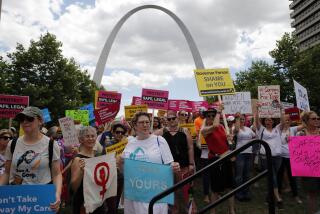Sign a petition, disclose your name?
- Share via
When a citizen signs a petition to place an initiative on the ballot, is he or she acting as a voter or as a legislator? How the Supreme Court answers that question will determine whether states can make the names of signers public. It’s a close call, but the court should decide in favor of disclosure.
In a sequence of events reminiscent of the battle over California’s Proposition 8, opponents of gay rights in Washington state gathered enough signatures to force a referendum on overturning a generous domestic-partnership law. The initiative failed to pass, but controversy continues about whether the names of those who signed the ballot petitions should be released (and possibly posted on the Internet).
Unlike California, Washington treats petitions as public records accessible to all. But in October, the Supreme Court temporarily blocked release of the 138,500 names after Protect Marriage Washington filed suit, claiming among other things that disclosure would expose signers to scorn and harassment. (Proposition 8 proponents used a similar argument to persuade the Supreme Court to block the televising of the current trial over the constitutionality of that measure.) Now the court has announced that it will decide whether petition signers have a constitutional right to have their names kept secret.
Protect Marriage argues that signing a petition is an exercise of free speech, and that the court has recognized that anonymous political expression is protected by the 1st Amendment. But that principle, announced in a 1995 Ohio case involving anonymous leaflets, had to do with speech, not the legislative process. As Washington’s secretary of state pointed out in a brief to the Supreme Court: “Under the Washington Constitution, the people of the state reserve the legislative powers of initiative and referendum,” making them akin to legislators whose names are public.
Some might argue that voting in a referendum is also part of the legislative process. But voting is traditionally a private act. Not so signing a petition, which takes place in public, not behind a curtain. The U.S. 9th Circuit Court of Appeals, ruling in favor of disclosure, noted that “each petition sheet contains spaces for 20 signatures, exposing each signature to view by up to 19 other signers and any number of potential signers.” Signatures also are examined by election officials and lawyers.
Finally, the argument that disclosure will bring harm to petition signers is overblown. Like legislators, citizens who sign a petition are potentially subject to harassment. Many political movements -- from the civil rights revolution to the campaign for abortion rights -- have inspired violent opposition. But the remedy for that problem is enforcement of criminal laws, not the withholding of public documents. If a state acts on its commitment to transparency, it shouldn’t be thwarted by a fallacious 1st Amendment argument.
More to Read
Sign up for Essential California
The most important California stories and recommendations in your inbox every morning.
You may occasionally receive promotional content from the Los Angeles Times.













